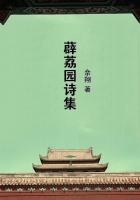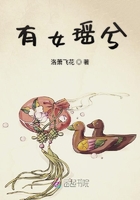Mr. Corliss concluded his momentary pause by walking up the broken cement path, which was hard beset by plantain-weed and the long grass of the ill-kept lawn. Ascending the steps, he was assailed by an odour as of vehement bananas, a diffusion from some painful little chairs standing in the long, high, dim, rather sorrowful hall disclosed beyond the open double doors.
They were stiff little chairs of an inconsequent, mongrel pattern; armless, with perforated wooden seats; legs tortured by the lathe to a semblance of buttons strung on a rod; and they had that day received a streaky coat of a gilding preparation which exhaled the olfactory vehemence mentioned. Their present station was temporary, their purpose, as obviously, to dry; and they were doing some incidental gilding on their own account, leaving blots and splashes and sporadic little round footprints on the hardwood floor.
The old-fashioned brass bell-handle upon the caller's right drooped from its socket in a dead fag, but after comprehensive manipulation on the part of the young man, and equal complaint on its own, it was constrained to permit a dim tinkle remotely.
Somewhere in the interior a woman's voice, not young, sang a repeated fragment of "Lead, Kindly Light," to the accompaniment of a flapping dust-cloth, sounds which ceased upon a second successful encounter with the bell. Ensued a silence, probably to be interpreted as a period of whispered consultation out of range; a younger voice called softly and urgently, "Laura!" and a dark-eyed, dark-haired girl of something over twenty made her appearance to Mr. Corliss.
At sight of her he instantly restored a thin gold card-case to the pocket whence he was in the act of removing it. She looked at him with only grave, impersonal inquiry; no appreciative invoice of him was to be detected in her quiet eyes, which may have surprised him, possibly the more because he was aware there was plenty of appreciation in his own kindling glance. She was very white and black, this lady. Tall, trim, clear, she looked cool in spite of the black winter skirt she wore, an effect helped somewhat, perhaps, by the crisp freshness of her white waist, with its masculine collar and slim black tie, and undoubtedly by the even and lustreless light ivory of her skin, against which the strong black eyebrows and undulated black hair were lined with attractive precision; but, most of all, that coolness was the emanation of her undisturbed and tranquil eyes. They were not phlegmatic: a continuing spark glowed far within them, not ardently, but steadily and inscrutably, like the fixed stars in winter.
Mr. Valentine Corliss, of Paris and Naples, removed his white-ribboned straw hat and bowed as no one had ever bowed in that doorway. This most vivid salutation--accomplished by adding something to a rather quick inclination of the body from the hips, with the back and neck held straight expressed deference without affecting or inviting cordiality. It was an elaborate little formality of a kind fancifully called "foreign," and evidently habitual to the performer.
It produced no outward effect upon the recipient. Such self-control is unusual.
"Is Mr. Madison at home? My name is Valentine Corliss."
"He is at home." She indicated an open doorway upon her right. "Will you wait in there?"
"Thank you," said Mr. Corliss, passing within. "I shall be----" He left the sentence unfinished, for he was already alone, and at liberty to reflect upon the extraordinary coolness of this cool young woman.
The room, with its closed blinds, was soothingly dark after the riotous sun without, a grateful obscurity which was one of two attractions discovered in it by Mr. Corliss while he waited.
It was a depressing little chamber, disproportionately high, uncheered by seven chairs (each of a different family, but all belonging to the same knobby species, and all upholstered a repellent blue), a scratched "inlaid table," likewise knobby, and a dangerous looking small sofa--turbulent furniture, warmly harmonious, however, in a common challenge to the visitor to take comfort in any of it. A once-gilt gas chandelier hung from the distant ceiling, with three globes of frosted glass, but undeniable evidence that five were intended; and two of the three had been severely bitten. There was a hostile little coal-grate, ****** a mouth under a mantel of imitation black marble, behind an old blue-satin fire-screen upon which red cat-tails and an owl over a pond had been roughly embroidered in high relief, this owl motive being the inspiration of innumerable other owls reflected in innumerable other ponds in the formerly silver moonlight with which the walls were papered. Corliss thought he remembered that in his boyhood, when it was known as "the parlour" (though he guessed that the Madison family called it "the reception room," now) this was the place where his aunt received callers who, she justifiably hoped, would not linger. Altogether, it struck him that it might be a good test-room for an alienist: no incipient lunacy would remain incipient here.















